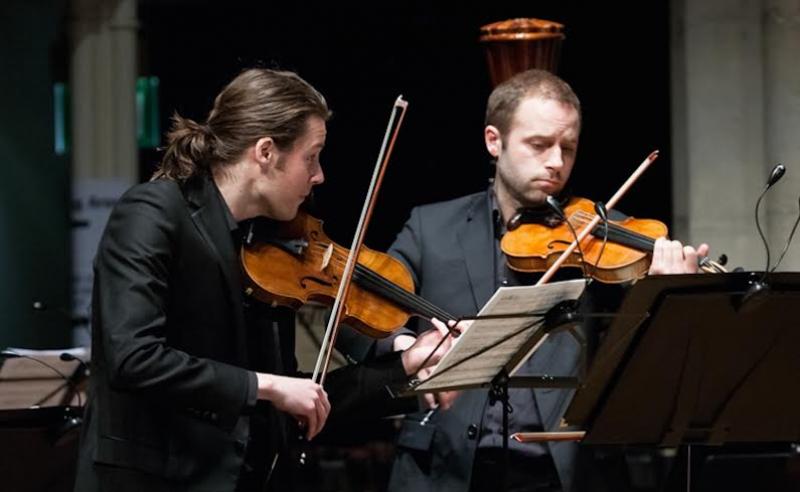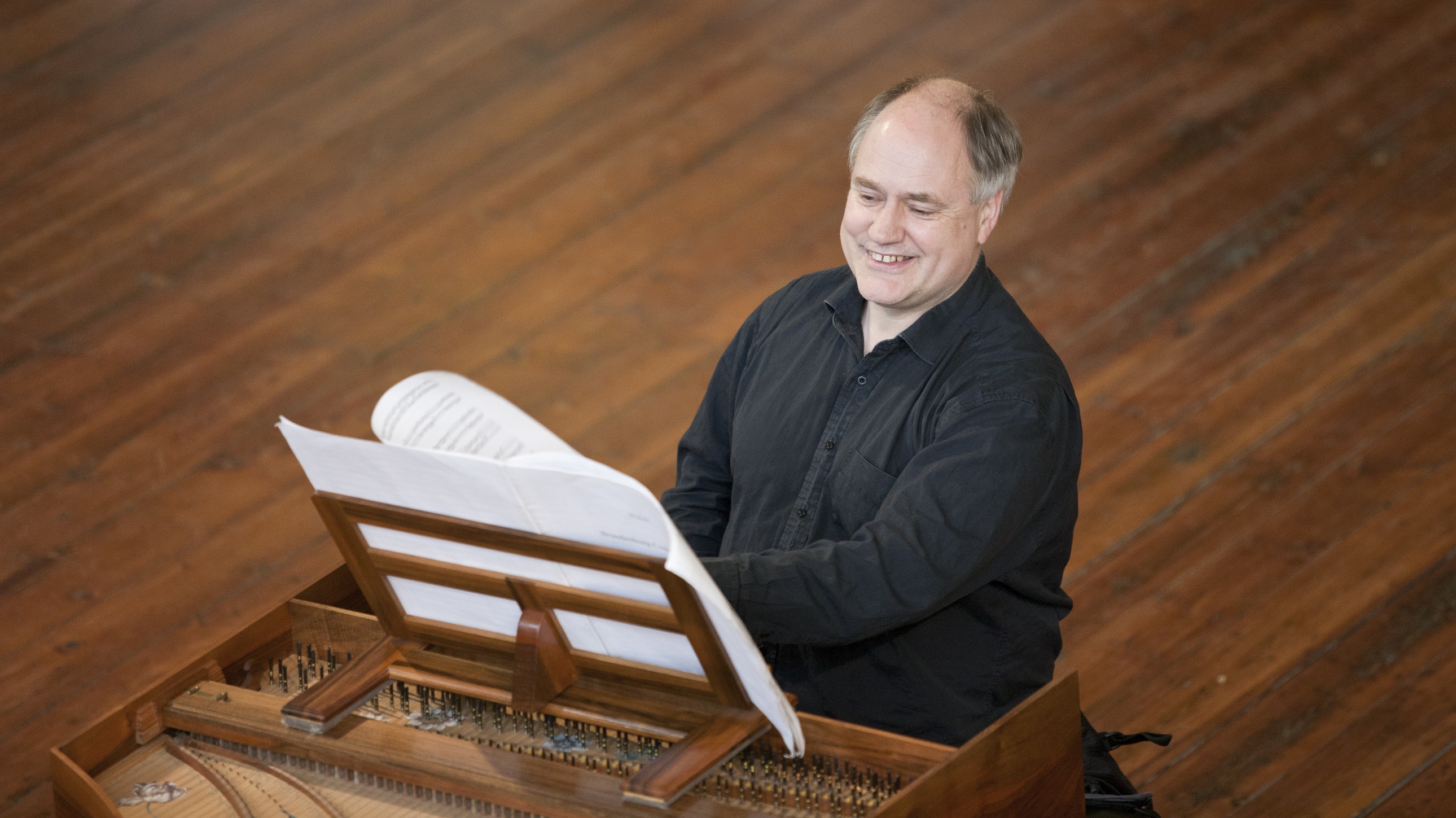Mozart's Piano 1, Butt, Aurora Orchestra, Kings Place | reviews, news & interviews
Mozart's Piano 1, Butt, Aurora Orchestra, Kings Place
Mozart's Piano 1, Butt, Aurora Orchestra, Kings Place
An evening of fabulous musicianship, though veering in the direction of a lecture-recital

One down, 26 to go. “Mozart's Piano” is a series of concerts by the Aurora Orchestra at Kings Place, based around a complete cycle of Mozart's piano concertos. It started last night, and will reach its conclusion in 2020.
It was Peter Millican of the Kings Place Music Foundation who first presented the idea of a Mozart piano concerto cycle to the orchestra. And – as is Aurora's highly successful and original way – they were determined not to place the concertos in standard concert programmes, but to create a series which would develop themes, and contain bold juxtapositions. For example the second concert in the series, in March, will have Mozart's travels to Georgian London as the pretext for a performance of Peter Maxwell Davies' Eight Songs for a Mad King. Several of the concerts are also followed by a “lock-in” session, targeting people much closer in age to the orchestra's members than the typical average audience for classical music.
 If future concerts are going to stray deliberately away from Mozart and his era, this first concert in the series hugged the shore and stayed in the period before and during Mozart's life. It marked the orchestra's very first collaboration with scholar- keyboard player-baroque specialist John Butt (pictured right by David Barbour), who had devised the programme, directed proceedings from the harpsichord, and was also interviewed repeatedly between the pieces by BBC Radio 3 presenter Sara Mohr-Pietsch.
If future concerts are going to stray deliberately away from Mozart and his era, this first concert in the series hugged the shore and stayed in the period before and during Mozart's life. It marked the orchestra's very first collaboration with scholar- keyboard player-baroque specialist John Butt (pictured right by David Barbour), who had devised the programme, directed proceedings from the harpsichord, and was also interviewed repeatedly between the pieces by BBC Radio 3 presenter Sara Mohr-Pietsch.
The concert programme drew its inspiration from a slightly adapted Mozart quotation, "Bach is the father; we are the children," with Mozart's original words wir sind die Bubn (”we are the boys”) tweaked in translation in the direction of gender neutrality.
The Bach to whom Mozart was actually referring was the second son of JS Bach, CPE Bach, rather than JS himself. CPE was represented on the programme by the first of his “Hamburg” symphonies, an astonishingly bold piece: its daemonic string-crunches, syncopations, unusual instrumental combinations and bravura all came across very strongly in this performance, but it was an all-too brief encounter. Butt couldn't resist also presenting other members of the Bach family too. The concert opened with a vivid, stormy work by JC Bach, and there was also an exploration of Mozart's own deeper involvement with JS Bach in the 1780s. The second half consisted of two Brandenburg concertos, Nos. 1 and 3, with, placed between them, one of the darkest pieces in all of Mozart's output, the Adagio and Fugue in C minor of 1782/88, vividly played by the strings of the orchestra, really digging and producing a sense of drama.
Butt was also highly sensitive to the acoustics of the hall
There were all kinds of interesting vignettes. This is the second time I have heard a concert by the Aurora Orchestra where the “problem” of the missing slow movement in Bach's Brandenburg Concerto No. 3 has been imaginatively addressed. On the previous occasion, Arvo Pärt's "If Bach had been a Beekeeper" was inserted. Here, Butt had come up with the idea of the slow movement of a Bach G major violin sonata, excellently played by Thomas Gould with Butt at the harpsichord.
As a concert it suffered from trying to cram in too many themes, veering in the direction of a lecture-recital rather than a concert, and will probably work better in radio broadcast. In the midst of all these to-and-fro-ings and conversations between Mohr-Pietsch and Butt it was perhaps Mozart's Piano Concerto No.1 in F Major, written when Mozart was 11, and the original pretext for the concert, that got shortest shrift. It is a rarely heard work without its own proper performing tradition, and it felt unfamiliar. Perhaps it was inevitable given Butt's huge role in keeping the whole show on the road that occasional signs of tiredness and tentativeness would creep in. The filigree detail in the fast outer movements had some finger-slips, and the slow movement was pleasant enough, but somehow lacked conviction and shape.
That said, general musical standards were exceptionally high throughout, and in a programme of twists and turns and contrasts there were many moments of sheer delight. Wind soloists of the calibre of bassoonist Peter Whelan and pricipal horn Nicolas Fleury brought immense character to the first Bach Brandenburg concerto. Butt was also highly sensitive to the acoustics of the hall, clearly relishing the short echo at the end of movements. And the joyous G major of the third Brandenburg concerto was just the right thing to send the audience off happily into the winter night.
rating
Explore topics
Share this article
The future of Arts Journalism
You can stop theartsdesk.com closing!
We urgently need financing to survive. Our fundraising drive has thus far raised £49,000 but we need to reach £100,000 or we will be forced to close. Please contribute here: https://gofund.me/c3f6033d
And if you can forward this information to anyone who might assist, we’d be grateful.

Subscribe to theartsdesk.com
Thank you for continuing to read our work on theartsdesk.com. For unlimited access to every article in its entirety, including our archive of more than 15,000 pieces, we're asking for £5 per month or £40 per year. We feel it's a very good deal, and hope you do too.
To take a subscription now simply click here.
And if you're looking for that extra gift for a friend or family member, why not treat them to a theartsdesk.com gift subscription?
more Classical music
 BBC Proms: Ehnes, Sinfonia of London, Wilson review - aspects of love
Sensuous Ravel, and bittersweet Bernstein, on an amorous evening
BBC Proms: Ehnes, Sinfonia of London, Wilson review - aspects of love
Sensuous Ravel, and bittersweet Bernstein, on an amorous evening
 Presteigne Festival 2025 review - new music is centre stage in the Welsh Marches
Music by 30 living composers, with Eleanor Alberga topping the bill
Presteigne Festival 2025 review - new music is centre stage in the Welsh Marches
Music by 30 living composers, with Eleanor Alberga topping the bill
 Lammermuir Festival 2025 review - music with soul from the heart of East Lothian
Baroque splendour, and chamber-ensemble drama, amid history-haunted lands
Lammermuir Festival 2025 review - music with soul from the heart of East Lothian
Baroque splendour, and chamber-ensemble drama, amid history-haunted lands
 BBC Proms: Steinbacher, RPO, Petrenko / Sternath, BBCSO, Oramo review - double-bill mixed bag
Young pianist shines in Grieg but Bliss’s portentous cantata disappoints
BBC Proms: Steinbacher, RPO, Petrenko / Sternath, BBCSO, Oramo review - double-bill mixed bag
Young pianist shines in Grieg but Bliss’s portentous cantata disappoints
 theartsdesk at the Lahti Sibelius Festival - early epics by the Finnish master in context
Finnish heroes meet their Austro-German counterparts in breathtaking interpretations
theartsdesk at the Lahti Sibelius Festival - early epics by the Finnish master in context
Finnish heroes meet their Austro-German counterparts in breathtaking interpretations
 Classical CDs: Sleigh rides, pancakes and cigars
Two big boxes, plus new music for brass and a pair of clarinet concertos
Classical CDs: Sleigh rides, pancakes and cigars
Two big boxes, plus new music for brass and a pair of clarinet concertos
 Waley-Cohen, Manchester Camerata, Pether, Whitworth Art Gallery, Manchester review - premiere of no ordinary violin concerto
Images of maternal care inspired by Hepworth and played in a gallery setting
Waley-Cohen, Manchester Camerata, Pether, Whitworth Art Gallery, Manchester review - premiere of no ordinary violin concerto
Images of maternal care inspired by Hepworth and played in a gallery setting
 BBC Proms: Barruk, Norwegian Chamber Orchestra, Kuusisto review - vague incantations, precise laments
First-half mix of Sámi songs and string things falters, but Shostakovich scours the soul
BBC Proms: Barruk, Norwegian Chamber Orchestra, Kuusisto review - vague incantations, precise laments
First-half mix of Sámi songs and string things falters, but Shostakovich scours the soul
 BBC Proms: Alexander’s Feast, Irish Baroque Orchestra, Whelan review - rapturous Handel fills the space
Pure joy, with a touch of introspection, from a great ensemble and three superb soloists
BBC Proms: Alexander’s Feast, Irish Baroque Orchestra, Whelan review - rapturous Handel fills the space
Pure joy, with a touch of introspection, from a great ensemble and three superb soloists
 BBC Proms: Moore, LSO, Bancroft review - the freshness of morning wind and brass
English concert band music...and an outlier
BBC Proms: Moore, LSO, Bancroft review - the freshness of morning wind and brass
English concert band music...and an outlier
 Willis-Sørensen, Ukrainian Freedom Orchestra, Wilson, Cadogan Hall review - romantic resilience
Passion, and polish, from Kyiv's musical warriors
Willis-Sørensen, Ukrainian Freedom Orchestra, Wilson, Cadogan Hall review - romantic resilience
Passion, and polish, from Kyiv's musical warriors
 BBC Proms: Faust, Gewandhausorchester Leipzig, Nelsons review - grace, then grandeur
A great fiddler lightens a dense orchestral palette
BBC Proms: Faust, Gewandhausorchester Leipzig, Nelsons review - grace, then grandeur
A great fiddler lightens a dense orchestral palette

Add comment